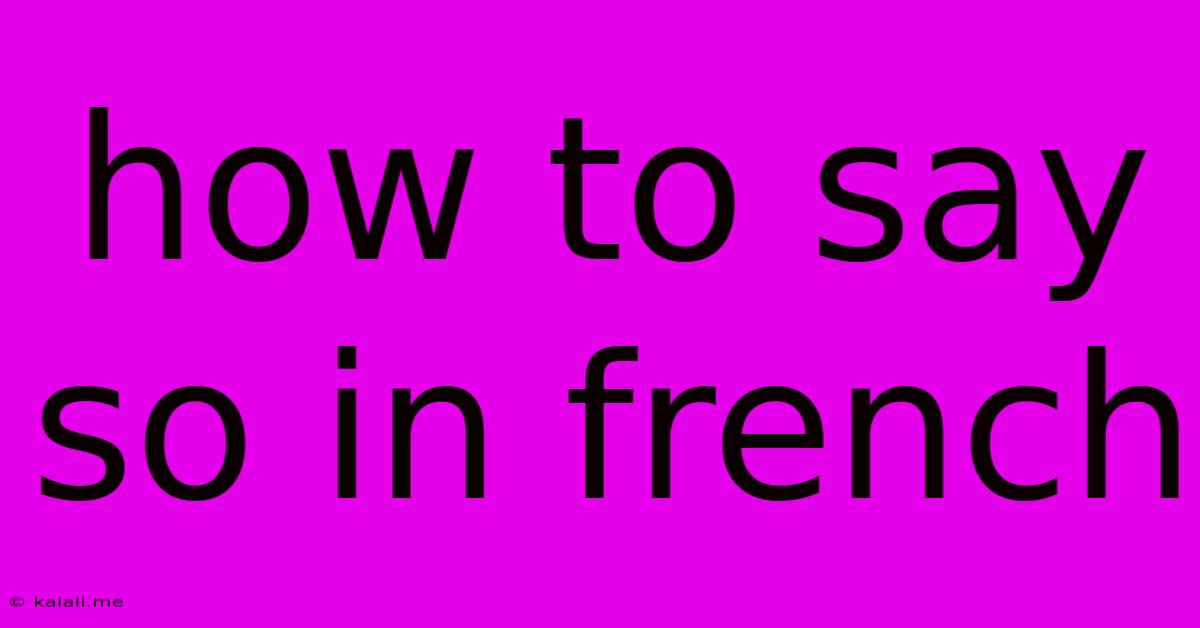How To Say So In French
Kalali
May 25, 2025 · 3 min read

Table of Contents
How to Say "So" in French: A Comprehensive Guide
Knowing how to say "so" in French can significantly improve your conversational skills and comprehension. However, the direct translation of "so" isn't always straightforward, as its meaning varies depending on the context. This article explores the various ways to express the nuances of "so" in French, ensuring you choose the most appropriate word or phrase for any given situation. This guide covers everything from simple translations to more complex expressions, equipping you with the tools to communicate effectively in French.
Understanding the Multifaceted Nature of "So"
The English word "so" is incredibly versatile. It can act as an adverb, conjunction, pronoun, or even an adjective, depending on the sentence. This multiplicity requires a nuanced approach when translating into French. We'll explore the different meanings of "so" and their corresponding French equivalents.
1. "So" as an Adverb Indicating Degree or Extent
This is perhaps the most common usage of "so." It signifies a high degree or extent of something. For example: "It's so cold!"
- French equivalent: The most common translation here is "tellement". "Il fait tellement froid!" (It's so cold!) Other options include "si", although this is often used before an adjective, and "aussi", which implies a comparison. The choice depends on the nuance you want to convey.
2. "So" as an Adverb Meaning "Therefore" or "Consequently"
This usage indicates a cause-and-effect relationship. "It's raining, so I'll stay inside."
- French equivalent: Here, you would use words like "donc," "par conséquent," or "ainsi." "Il pleut, donc je resterai à l'intérieur." (It's raining, therefore I'll stay inside.) "Donc" is generally preferred for its informality and natural flow.
3. "So" as a Conjunction Meaning "In such a way" or "To such an extent"
This usage introduces a result or consequence. "He studied so hard, he passed the exam."
- French equivalent: Again, "donc" or "par conséquent" work well here. You could also use "de sorte que" (in such a way that) for a more formal tone. "Il a tellement étudié qu'il a réussi l'examen." (He studied so hard that he passed the exam). Note the use of "tellement" here to emphasize the degree of effort.
4. "So" as a Conjunction Introducing a Clause of Reason
This signifies a reason or explanation. "So I decided to go."
- French equivalent: In this case, "alors" (then) or "c'est pourquoi" (that's why) are suitable choices. "Alors j'ai décidé d'y aller." (So I decided to go.)
5. "So" as a Response Indicating Agreement or Understanding
"So, you're coming?"
- French equivalent: This often requires a more contextual response. Simple affirmations like "Oui," (Yes) or "D'accord," (Okay) might suffice. You could also use phrases like "Alors, oui," (So, yes) to mirror the original structure.
6. "So" as an Intensifier before an Adjective or Adverb
"He's so kind."
- French equivalent: Here, "tellement" or "si" work well, depending on the nuance. "Il est tellement gentil." (He's so kind.) or "Il est si gentil."
Conclusion:
Mastering the translation of "so" in French requires careful consideration of the context. There isn't one single equivalent. By understanding the different nuances and utilizing the appropriate words and phrases, you'll greatly enhance your ability to express yourself naturally and effectively in French. Remember to practice regularly and pay attention to how native speakers use these words in different situations. This will help solidify your understanding and improve your fluency.
Latest Posts
Latest Posts
-
Turning Off Electric Water Heater When Not In Use
May 25, 2025
-
Open The Box Lid For Light Square 1960
May 25, 2025
-
More Than You Can Shake A Stick At
May 25, 2025
-
Press The Push Bar To Activate Control
May 25, 2025
-
How Did Narcissa Know Harry Was Alive
May 25, 2025
Related Post
Thank you for visiting our website which covers about How To Say So In French . We hope the information provided has been useful to you. Feel free to contact us if you have any questions or need further assistance. See you next time and don't miss to bookmark.